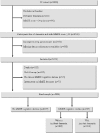Excessive sleepiness is predictive of cognitive decline in the elderly
- PMID: 22942498
- PMCID: PMC3413797
- DOI: 10.5665/sleep.2070
Excessive sleepiness is predictive of cognitive decline in the elderly
Abstract
Study objectives: To examine the association of sleep complaints reported at baseline (insomnia complaints and excessive daytime sleepiness (EDS)) and medication, with cognitive decline in community-dwelling elderly.
Design: An 8-yr longitudinal study.
Setting: The French Three-City Study.
Participants: There were 4,894 patients without dementia recruited from 3 French cities and having a Mini-Mental Status Examination (MMSE) score ≥ 24 points at baseline.
Measurements and results: Questionnaires were used to evaluate insomnia complaints (poor sleep quality (SQ), difficulty in initiating sleep (DIS), difficulty in maintaining sleep (DMS), early morning awakening (EMA)), EDS, and sleep medication at baseline. Cognitive decline was defined as a 4-point reduction in MMSE score during follow-up at 2, 4, and 8 yr. Logistic regression models were adjusted for sociodemographic, behavioral, physical, and mental health variables, and apolipoprotein E genotype. EDS independently increased the risk of cognitive decline (odds ratio (OR) = 1.26, 95% confidence interval (CI) = 1.02-1.56), especially for those patients who also developed dementia during the follow-up period (OR = 1.39, 95% CI = 1.00-1.97). The number of insomnia complaints and DMS were negatively associated with MMSE cognitive decline (OR = 0.77, 95% CI = 0.60-0.98 for 3-4 complaints, OR = 0.81, 95% CI = 0.68-0.96, respectively). The 3 other components of insomnia (SQ, DIS, EMA) were not significantly associated with MMSE cognitive decline.
Conclusions: Our results suggest that EDS may be associated independently with the risk of cognitive decline in the elderly population. Such results could have important public health implications because EDS may be an early marker and potentially reversible risk factor of cognitive decline and onset of dementia.
Keywords: Sleepiness; cognitive decline; dementia; elderly; insomnia.
Figures
Comment in
-
Making sense of sleepiness in the elderly.Sleep. 2012 Sep 1;35(9):1189-90. doi: 10.5665/sleep.2058. Sleep. 2012. PMID: 22942492 Free PMC article. No abstract available.
References
-
- Glisky EL. Changes in cognitive function in human aging. In: Riddle DR, editor. Brain aging: models, methods, and mechanisms. Boca Raton (FL): CRC Press,; 2007. - PubMed
-
- Ohayon MM, Carskadon MA, Guilleminault C, Vitiello MV. Meta-analysis of quantitative sleep parameters from childhood to old age in healthy individuals: developing normative sleep values across the human lifespan. Sleep. 2004;27:1255–73. - PubMed
-
- Vitiello MV. Sleep disorders and aging: understanding the causes. J Gerontol A Biol Sci Med Sci. 1997;52:M189–91. - PubMed
-
- Foley DJ, Monjan AA, Brown SL, Simonsick EM, Wallace RB, Blazer DG. Sleep complaints among elderly persons: an epidemiologic study of three communities. Sleep. 1995;18:425–32. - PubMed
-
- Killgore WD. Effects of sleep deprivation on cognition. Prog Brain Res. 2010;185:105–29. - PubMed
Publication types
MeSH terms
LinkOut - more resources
Full Text Sources
Research Materials


